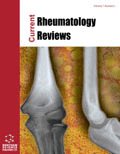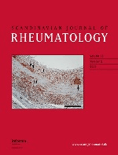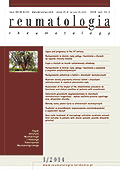
Acta Reumatologica Portuguesa
Scope & Guideline
Connecting professionals to groundbreaking rheumatic research.
Introduction
Aims and Scopes
- Multidisciplinary Collaboration in Rheumatology:
The journal emphasizes the importance of collaborative approaches between various specialties, such as Dermatology and Rheumatology, to enhance patient care and treatment outcomes for complex conditions like psoriatic disease. - Clinical and Case Studies:
A significant portion of the journal's content is dedicated to clinical case reports and studies that provide insights into rare and complex rheumatic conditions, helping to broaden the understanding of these diseases. - Treatment and Management Strategies:
The journal regularly publishes research on the efficacy of various treatment modalities, including biologics, non-pharmacological interventions, and the management of comorbidities like osteoporosis and obesity in rheumatic patients. - Patient-Centered Care and Quality of Life:
There is a consistent focus on improving the patient-physician relationship, assessing disease activity, and fostering person-centered care, which are crucial for enhancing the quality of life of patients with rheumatic diseases. - Emerging Trends and Innovations:
The journal also highlights innovative research methodologies and emerging trends in rheumatology, including the exploration of biobanks and the impact of COVID-19 on rheumatology practices.
Trending and Emerging
- Impact of COVID-19 on Rheumatology Practice:
The journal has increasingly focused on the implications of the COVID-19 pandemic for rheumatology, including its effects on treatment regimens and patient outcomes, emphasizing the need for adaptive strategies in clinical practice. - Multidisciplinary Approaches to Patient Care:
There is a growing emphasis on multidisciplinary care models that integrate various healthcare professionals to improve management strategies for complex rheumatic diseases, reflecting a trend towards holistic patient management. - Role of Obesity and Comorbidities in Rheumatic Diseases:
Recent studies have shown a rising interest in the role of obesity and other comorbidities in the progression and management of rheumatic diseases, underscoring the importance of a comprehensive approach to treatment. - Patient-Reported Outcomes and Quality of Life Assessments:
The trend towards incorporating patient-reported outcomes and quality of life assessments into clinical research is gaining momentum, indicating a shift towards prioritizing patient experiences and satisfaction. - Innovations in Treatment Protocols and Biologics:
The journal showcases an increasing number of papers discussing the latest innovations in biologic therapies and treatment protocols, highlighting advancements in personalized medicine and targeted therapies in rheumatology.
Declining or Waning
- Traditional Therapies and Conventional Approaches:
There seems to be a decline in the publication of studies focusing solely on traditional therapies and conventional management approaches, as the field increasingly emphasizes innovative and personalized treatment strategies. - Rare Disease Case Reports:
Although rare diseases are still addressed, the frequency of dedicated case reports on extremely uncommon rheumatic conditions appears to be waning, possibly due to a shift towards more prevalent conditions and broader patient populations. - Basic Science Research:
Research focusing on basic science aspects of rheumatic diseases, such as molecular mechanisms and pathophysiology, is less frequently published, indicating a potential shift towards clinical applications and outcomes. - Epidemiological Studies on Historical Trends:
There is a noticeable reduction in epidemiological studies that analyze historical trends in rheumatic diseases, as recent research focuses more on current challenges and immediate concerns, such as the COVID-19 pandemic.
Similar Journals

Current Rheumatology Reviews
Exploring breakthroughs in rheumatology advancements.Current Rheumatology Reviews is an esteemed journal dedicated to publishing comprehensive reviews on advancements in the field of rheumatology. Established by Bentham Science Publishers, this journal has become a vital resource for researchers, clinicians, and students seeking to stay abreast of the latest developments and therapeutic strategies from 2006 to 2024. Located in the United Arab Emirates, it caters to a global audience, delivering insights that have been pivotal in shaping clinical practices. With an impact factor reflective of its Q3 status in Rheumatology by 2023, the journal ranks #46 out of 73 in the Scopus database, positioning it in the 37th percentile in the discipline. Although it operates without open access, its high-quality content ensures that each article undergoes rigorous peer review, making the Current Rheumatology Reviews a trusted platform for disseminating critical research findings and reviews that drive forward the understanding and treatment of rheumatic diseases.

Pediatric Rheumatology
Advancing pediatric care through groundbreaking research.Pediatric Rheumatology is a leading peer-reviewed open access journal published by BMC, dedicated to disseminating high-quality research in the field of pediatric rheumatology. Since its inception in 2007, the journal has established itself as a vital resource for healthcare professionals, researchers, and students focused on pediatric immunology, rheumatology, and child health, maintaining an impressive Q1 ranking in Pediatrics and Q2 in Immunology and Allergy as well as Rheumatology for 2023. It is recognized for its impact on advancing knowledge and clinical practice, with significant contributions noted in various studies and case reports. With access options that embrace the ethos of open science, all articles published in Pediatric Rheumatology are freely available, promoting collaborative research and discussion among practitioners across the globe. The journal welcomes submissions that encapsulate innovative research, clinical trials, and reviews that address both current challenges and advancements within the pediatric rheumatology landscape.

RHEUMATIC DISEASE CLINICS OF NORTH AMERICA
Exploring the forefront of rheumatic disease research.Rheumatic Disease Clinics of North America is a premier journal published by W B Saunders Co-Elsevier Inc, dedicated to advancing the field of rheumatology through comprehensive and impactful research. With an ISSN of 0889-857X and an E-ISSN of 1558-3163, this esteemed publication has been disseminating knowledge since its inception in 1987, and continues to guide clinicians and researchers alike through its insightful articles and case studies. Positioned in the 2023 Q2 quartile for Rheumatology, it ranks #31 out of 73 journals in the Scopus category of Medicine _ Rheumatology, reflecting a commendable impact factor and relevance in the academic community. Although it does not offer open access options, the journal ensures that subscribers have access to cutting-edge research and reviews that address contemporary challenges and advancements in rheumatic disease. With its authoritative content, Rheumatic Disease Clinics of North America serves as a vital resource for those striving to improve patient care and clinical outcomes in the ever-evolving landscape of rheumatology research.

Advances in Rheumatology
Empowering discoveries in rheumatic disease management.Advances in Rheumatology is a premier open-access journal published by BMC, dedicated to advancing the field of rheumatology through high-quality, peer-reviewed research. Launched in 2018, the journal has quickly established itself within the academic community, achieving a commendable Q2 ranking in the category of Rheumatology as of 2023 and ranking #34 out of 73 in the Scopus Medicine Rheumatology listings, placing it in the 54th percentile. With a focus on innovative treatments, patient care, and the latest in rheumatological research, the journal provides a platform for researchers and clinicians to disseminate their findings and foster collaborative advancements in this critical area of medicine. Recognized for its accessibility, the journal follows an open-access model, ensuring that research is freely available to a global audience. With a commitment to high standards of academic rigor, Advances in Rheumatology plays a vital role in enhancing the understanding and treatment of rheumatic diseases, making it an invaluable resource for researchers, professionals, and students alike.

Rheumatology Advances in Practice
Empowering rheumatology through innovation and education.Rheumatology Advances in Practice, published by Oxford University Press, is a vital open-access journal dedicated to advancing research and education in the field of rheumatology. With an E-ISSN of 2514-1775 and an impressive open access model established since 2017, this journal facilitates the dissemination of cutting-edge knowledge and innovative practices to a global audience. It has garnered recognition within the academic community, holding a Q3 classification in Rheumatology for 2023, which reflects its contribution to the evolving landscape of rheumatological research. The journal aims to present high-quality, peer-reviewed articles that explore the latest findings, advancements, and clinical applications in rheumatology, making it an essential resource for researchers, healthcare professionals, and students alike. By bridging the gap between research and practice, Rheumatology Advances in Practice plays a significant role in improving the care of patients with rheumatological conditions, promoting evidence-based approaches to clinical challenges.

Current Treatment Options in Rheumatology
Elevating standards of care with timely research in rheumatology.Current Treatment Options in Rheumatology, published by SPRINGERNATURE, is a pivotal journal focused on advancing the field of rheumatology through the dissemination of cutting-edge research and comprehensive reviews. With an emphasis on current therapeutic strategies, this journal aims to provide healthcare professionals, researchers, and students with up-to-date information on the latest treatment modalities for rheumatic diseases. Although it operates under a subscription model, it offers a platform for sharing significant findings that can influence clinical practice and policy within the field of rheumatology. By promoting insightful discussions and collaborations, Current Treatment Options in Rheumatology plays a crucial role in shaping the future of rheumatic disease management and improving patient outcomes.

SCANDINAVIAN JOURNAL OF RHEUMATOLOGY
Connecting Scholars to Transform Rheumatological CareThe Scandinavian Journal of Rheumatology, published by Taylor & Francis Ltd, is a prestigious peer-reviewed journal dedicated to advancing research in the fields of rheumatology, immunology, and related disciplines. With an ISSN of 0300-9742 and an E-ISSN of 1502-7732, this journal has established itself as a vital platform for disseminating significant findings and innovative approaches in the management of rheumatic diseases since its inception in 1959. As a recognized scholarly outlet, it currently resides within the Q2 category for Medicine (miscellaneous) and ranks #39 out of 73 in Rheumatology according to the 2023 Scopus assessments. This reflects the journal's commitment to high-quality research and its relevance in the scientific community. Although it does not provide Open Access options, the journal's rigorous selection process ensures that only the most impactful research reaches its audience, making it a crucial resource for researchers, clinicians, and students engaged in the exploration of rheumatological and immunological challenges. The journal's broad scope encompasses ongoing studies, clinical trials, and reviews that aim to enhance understanding and treatment of rheumatic conditions, promoting collaboration and knowledge-sharing among professionals in the field.

Reumatologia
Empowering healthcare through open access research.Reumatologia is a dedicated open-access journal published by TERMEDIA PUBLISHING HOUSE LTD that has been serving the global scientific community since 2005. The journal focuses on the fields of Rheumatology, Immunology, and Allergy, providing a rich platform for researchers and practitioners to share innovative findings, clinical insights, and methodologies. With its roots tracing back to the early 1960s and a steady convergence of quality content through 2024, Reumatologia has secured a place in the academic landscape, currently holding a Q4 rating in Immunology and a Q3 rating in both Immunology and Allergy and Rheumatology categories for 2023. While the journal ranks #42 out of 73 in the Medicine - Rheumatology category, its open-access model ensures that research is widely disseminated, enhancing visibility and accessibility to vital knowledge that shapes therapeutic practices. Located in Poznan, Poland, Reumatologia remains a pivotal source of credible research, fostering collaboration among academics, healthcare professionals, and students internationally.

Journal of Rheumatic Diseases
Advancing knowledge in rheumatology for a healthier tomorrow.Journal of Rheumatic Diseases, published by the Korean College of Rheumatology, stands as a pivotal platform in the field of rheumatology, contributing significantly to the advancement of knowledge and clinical practice since its inception. With an impact factor reflecting its esteemed position in the academic community, this open-access journal promotes accessibility to high-quality research, ensuring that groundbreaking discoveries are reachable to all stakeholders in the realm of rheumatic diseases. The journal has maintained its commitment to quality, evidenced by its ranking in the Q3 category for Rheumatology in 2023, and its presence among the top quartiles of medical research. Focusing on innovative therapeutic approaches, emerging diagnostic techniques, and comprehensive reviews, the Journal of Rheumatic Diseases seeks to foster collaboration and dialogue among researchers, clinicians, and students alike. For accessibility, the journal offers numerous articles since its transition to open access in 2017, thereby facilitating research dissemination across the globe. As it converges over the years from 2019 to 2024, the journal promises to be instrumental in shaping the future of rheumatic disease research, inviting contributions that inspire new frontiers in this essential field.

Reumatologia Clinica
Pioneering the path to innovative rheumatology treatments.Reumatologia Clinica is a distinguished journal dedicated to the field of Rheumatology, published by Elsevier España SLU. With its ISSN of 1699-258X and E-ISSN 1885-1398, the journal aims to disseminate pivotal research findings and clinical studies from 2005 to 2024, spotlighting advancements in the understanding and treatment of rheumatic diseases. Based in Barcelona, Spain, it plays a vital role in the academic community, ranking in the Q3 category for Rheumatology as of 2023, with a Scopus ranking of #44 out of 73, placing it in the 40th percentile. Although it operates under a traditional access model, the journal is committed to academic excellence, providing researchers, healthcare professionals, and students with invaluable insights that drive the field forward. Reumatologia Clinica serves as an essential resource for those looking to deepen their knowledge and contribute to the evolving landscape of rheumatologic research.